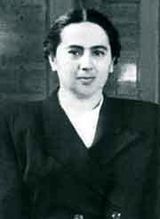
Kovkab Safaraliyeva
Encyclopedia

Baku
Baku , sometimes spelled as Baki or Bakou, is the capital and largest city of Azerbaijan, as well as the largest city on the Caspian Sea and of the Caucasus region. It is located on the southern shore of the Absheron Peninsula, which projects into the Caspian Sea. The city consists of two principal...
– 27 June 1985, Baku
Baku
Baku , sometimes spelled as Baki or Bakou, is the capital and largest city of Azerbaijan, as well as the largest city on the Caspian Sea and of the Caucasus region. It is located on the southern shore of the Absheron Peninsula, which projects into the Caspian Sea. The city consists of two principal...
) was an Azerbaijan
Azerbaijan
Azerbaijan , officially the Republic of Azerbaijan is the largest country in the Caucasus region of Eurasia. Located at the crossroads of Western Asia and Eastern Europe, it is bounded by the Caspian Sea to the east, Russia to the north, Georgia to the northwest, Armenia to the west, and Iran to...
i classical pianist, piano instructor, and concertmaster.
Career
She was born in Baku (then part of the Russian EmpireRussian Empire
The Russian Empire was a state that existed from 1721 until the Russian Revolution of 1917. It was the successor to the Tsardom of Russia and the predecessor of the Soviet Union...
, now the capital of Azerbaijan) and was one of the five children of Kamil Safaraliyev and Gamartaj Ziyadkhanova. Her parents, particularly fond of music and willing to share their interests with their children, hired private music tutors for them. Kovkab and her sisters were trained in piano
Piano
The piano is a musical instrument played by means of a keyboard. It is one of the most popular instruments in the world. Widely used in classical and jazz music for solo performances, ensemble use, chamber music and accompaniment, the piano is also very popular as an aid to composing and rehearsal...
; one of her brothers played the violin
Violin
The violin is a string instrument, usually with four strings tuned in perfect fifths. It is the smallest, highest-pitched member of the violin family of string instruments, which includes the viola and cello....
, and the other one the cello
Cello
The cello is a bowed string instrument with four strings tuned in perfect fifths. It is a member of the violin family of musical instruments, which also includes the violin, viola, and double bass. Old forms of the instrument in the Baroque era are baryton and viol .A person who plays a cello is...
. After the Sovietization
Sovietization
Sovietization is term that may be used with two distinct meanings:*the adoption of a political system based on the model of soviets .*the adoption of a way of life and mentality modelled after the Soviet Union....
of Azerbaijan in 1920, she started attending public piano course, and in 1926 she was admitted to the Azerbaijan State Conservatory
Baku Academy of Music
The Hajibeyov Baku Academy of Music is a music school in Baku, Azerbaijan. It was established in 1920 in Baku and was previously known as the Hajibeyov Azerbaijan State Conservatoire.-History:...
. At the same time, due to her outstanding skills, Safaraliyeva was selected to train students as a teacher's assistant, as well as to teach polyphony
Polyphony
In music, polyphony is a texture consisting of two or more independent melodic voices, as opposed to music with just one voice or music with one dominant melodic voice accompanied by chords ....
and musical literature to Azeriphone students.
In the early 1930s she performed as a pianist at the Baku Labour Theatre
Azerbaijan State Russian Drama Theatre
Azerbaijan State Russian Samed Vurgun Drama Theatre Azerbaijan State Russian Samed Vurgun Drama Theatre Azerbaijan State Russian Samed Vurgun Drama Theatre (Azeri: Səməd Vurğun adına Azərbaycan Dövlət Rus Drama Teatrı, Russian: Азербайджанский государственный русский драматический театр имени...
, and later worked at a concertmistress at the Azerbaijan Opera Theatre
Azerbaijan State Academic Opera and Ballet Theatre
The Akhundov Azerbaijan State Academic Opera and Ballet Theater is a theatre in Baku, Azerbaijan. It was built in 1911.-History:...
. After doing probation work in Moscow
Moscow
Moscow is the capital, the most populous city, and the most populous federal subject of Russia. The city is a major political, economic, cultural, scientific, religious, financial, educational, and transportation centre of Russia and the continent...
in 1935–1936 Safaraliyeva returned to Baku to teach at her alma mater. She was remembered by many for being a very hardworking, talented, demanding and charismatic instructor.
Between 1930 and 1939 Kovkab Safaraliyeva made numerous performances as a member of chamber orchestras. She is also the author of the widely-used text edition Plays Performed on the Piano Based on Azerbaijani Mugham, as well as a number of research articles.

